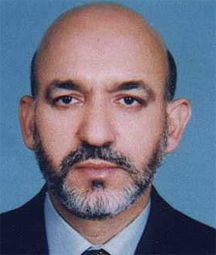KABUL, (Reuters) – President Hamid Karzai called yesterday for NATO troops to leave Afghan villages and confine themselves to major bases after the slaughter of 16 villagers by a U.S. soldier, underscoring fury over the massacre and clouding U.S. exit plans.

In a near-simultaneous announcement, the Afghan Taliban said it was suspending nascent peace talks with the United States seen as a way to end the country’s decade-long conflict, blaming “shaky, erratic and vague” U.S. statements.
The U.S. government said it remained committed to political reconciliation involving talks with the Taliban but progress would require agreement between the Afghan government and the insurgents.
Karzai, in a statement after meeting U.S. Defense Secretary Leon Panetta in Kabul on Thursday, said, “international security forces have to be taken out of Afghan village outposts and return to (larger) bases.”
Such a move could undercut President Barack Obama’s strategy for Afghanistan, hampering efforts to mentor Afghan police and help with local governance.
The soldier accused of carrying out the shooting was attached to a small special forces compound similar to others around the country which underpin NATO’s anti-insurgent strategy ahead of a 2014 deadline for Western combat forces to pull out.
The incident has harmed relations between Afghanistan and the United States and Karzai called for “all efforts … to avoid such incidents in the future.”
The nighttime killings in Kandahar province on Sunday have raised questions about Western strategy in Afghanistan and intensified calls for the withdrawal of foreign combat troops.
The United States played down Karzai’s call for NATO to pull out from Afghan villages. Pentagon officials said they did not believe he was calling for an immediate withdrawal to bases and said there was no change in U.S. plans for a gradual transition to Afghan security leadership.
“We believe that this statement reflects President Karzai’s strong interest in moving as quickly as possible to a fully independent and sovereign Afghanistan,” Pentagon spokesman George Little told reporters with Panetta in Abu Dhabi, where he flew after leaving Kabul earlier on Thursday.
Germany – which has the third largest contingent of NATO troops in Afghanistan – also played down the likely impact.
But in Washington, Republican senators opposed to an early withdrawal from Afghanistan said Karzai’s demands would doom to failure the plan for a transition to Afghan control over the next two years.
Senator John McCain, a member of the Armed Services Committee, said it was a losing strategy he could not agree to, a view echoed by Senator Lindsey Graham.
“We tried that in Iraq, where we stayed on bases, and Iraq devolved into chaos,” Graham told reporters. “Fighting … behind a wire, you can’t fight effectively.”
He said the U.S. forces were out in the villages to mentor Afghan police, train the army and help with governance.
TALIBAN TALKS
The Taliban decision to suspend the talks was a blow to NATO hopes of a negotiated end to the war, which has cost the United States $510 billion and the lives of more than 1,900 soldiers.
U.S. diplomats have been seeking to broaden exploratory talks with the Taliban that began clandestinely in Germany in late 2010 after the Taliban offered to open a representative office in Qatar.
“The Islamic Emirate has decided to suspend all talks with Americans taking place in Qatar from (Thursday) onwards until the Americans clarify their stance on the issues concerned and until they show willingness in carrying out their promises instead of wasting time,” the group said in a statement.
The Islamist movement said it was compelled to suspend talks as Washington had only responded to its demands, including the release of Taliban prisoners from Guantanamo Bay, Cuba, with a list of conditions that were “not only unacceptable, but also in contradiction with the earlier agreed upon points.”
The Taliban also said the idea of talks with Karzai’s government, which it dismissed as a U.S. “stooge,” was pointless and none had taken place. Karzai has previously said Afghan representatives had made contact with mid-level Taliban.
The White House said it remained committed to a negotiated solution.
“We support an Afghan-led process toward reconciliation. There is no likely resolution to the conflict in Afghanistan without a political resolution,” White House spokesman Jay Carney told reporters.
Washington said its only goal was to get the Afghan government and the Taliban to sit down together and start talking, but both sides would have to agree to make progress.
“That’s going to take two to tango. They’re going to have to decide what they want to do in this regard,” State Department spokeswoman Victoria Nuland told reporters.
She said that while the United States regarded its contacts with the Taliban thus far as preliminary, it believed there was “something there that should be nurtured and supported.”
RISING TENSION
The Taliban said it was fully prepared to continue its “long-term Jihadi strategies” as the traditional summer fighting months approached, following a harsh winter which saw a fall-off in fighting in several volatile provinces.
